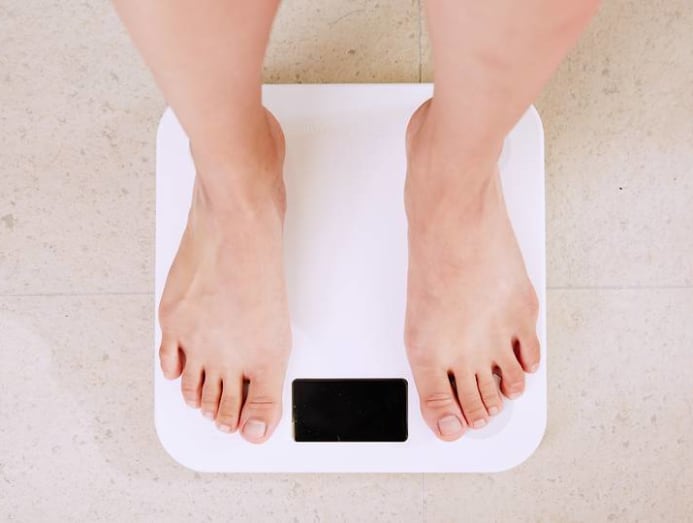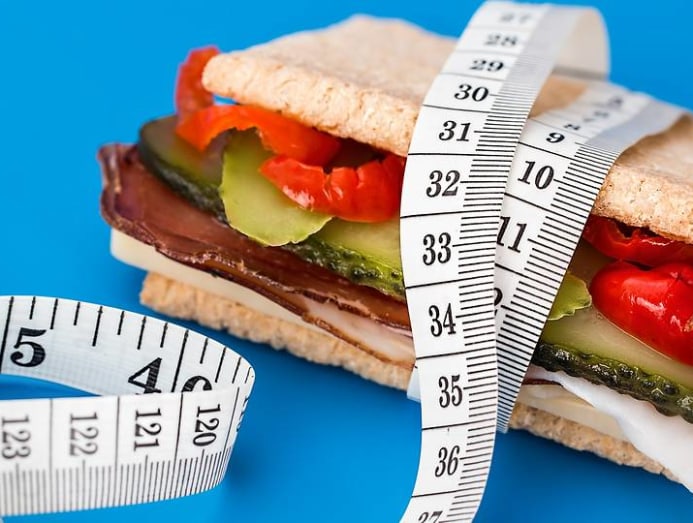Why diets don't work: The reason that weight you lost comes back with a vengeance
Advertisement
Health
Why diets don't piece of work: The reason that weight y'all lost comes back with a vengeance
The Ketogenic Diet, intermittent fasting and the various forms of high-protein, low-carb diets may be the rage now merely experts say don't get your hopes up.

(Photograph: iStock)
23 Jan 2022 06:30AM (Updated: 15 Aug 2022 02:36PM)
Hands up, if y'all're on a diet. Easily up, too, if you lot have tried everything, from slimming centres to the Ketogenic Diet, and haven't nudged a gram.
Nope, the 2kg loss from losing water doesn't count. And neither does the 5kg drop that comes dorsum a year later every bit an 8kg gain.
The comfort you can accept from this is, you're not alone. There's always someone in the office who is dieting.
Even in your circle of friends, at that place'south bound to be 1 or two individuals who have bandied effectually the D word from time to time.
On average, Singaporeans get through at to the lowest degree two diets in their lifetimes, said Pamela Er, senior dietitian at National University Hospital.
Other experts such as dietitian Jaclyn Reutens from Aptima Nutrition And Sports Consultants say it could be at to the lowest degree three diets.
"They endeavour one diet, they fail. So, they try again. The third failure could exist the terminal try," said Reutens.
DIET AND THE CITY
In fact, according to Er, the local diet scene has hit its peak scene right about now.
"It'due south been gradually building up over the last five years and gaining more than traction in the terminal two years," she said.
The surge could, in part, exist caused by technology. "Food is at present easily attainable with but an app," she said.
While food-ordering apps create the supply, social media platforms create the demand. "Instagram and Facebook ofttimes push nutrient content to users," said Er.
"They can be surfing these platforms in the eye of the night and they see such content, which triggers ghrelin, the hunger hormone that controls both eating behaviour and the physical processes involved in food metabolism."
READ: Scientists reveal 'ideal diet' for peoples' and planet's health
The proof is in the amount of calories Singaporeans consume daily: Six in ten Singaporeans ate more than the recommended 2,200 calories for men and more than than i,800 calories for women a day, according to the Health Promotion Lath.
Equally of 2017, 32.8 per cent of our population is overweight, making Singapore the second-fattest child in the Southeast Asian class.
There's also the pressure to be seen every bit trendy, noted Er.
Wellness food companies have been increasingly using marketing and advertizing tools on social media to cash in on the health tendency, and promote products such every bit juices or ketogenic diet meal plans, she said.

On the other hand, Reutens believed that the number of Singaporeans who diet isn't every bit high every bit nosotros think it is.
"I believe that the number of people who are on a nutrition make up a small percentage," said Reutens.
"And of these people, the bulk is on a fad diet, which means that there are no results or the results are not lasting.
The weight rebound effect is fifty-fifty greater. You lot can lose 3kg in two months but put on 4kg in a month."
THE HISTORY OF DIETING
If you think dieting to wait good and be healthier is a mod concept, it really goes a long way back.
All the mode to 1863, to be verbal.
Back in the 1800s, an obese English undertaker by the name of William Banting was frustrated that he was losing the battle of the bulge.
At 165cm tall, the 64-year-old weighed 91kg and had to go down the stairs backwards to avoid hurting his knees. He was also losing his hearing.
Zip budged the weighing scale's needle for Banting despite walking, equus caballus riding and gunkhole rowing for a few hours each day likewise as undergoing numerous slimming treatments, consuming weight-loss drinks and existence put through low-calorie diets (Sounds familiar?).

He was almost at wits' end when his ear, nose and throat specialist, whom he saw for his hearing loss, wrote him a diet plan: No potatoes, bread, carbohydrate, milk and beer.
Instead, eat four meals a mean solar day consisting of meat, vegetables and wine at almost every repast.
And it worked. And then elated was Banting with the results – he apparently lost 16kg in nine-and-a-one-half months – that he wrote and published Letter On Corpulence, Addressed To The Public to share his diet plan.
It was the genesis of the globe's first nutrition plan – and probably the starting time of the many forms of low-carb diets that you see today.
In fact, Banting's diet became so popular that people used to enquire, "Are you banting?" instead of, "Are you dieting?". And his book was nonetheless being published as recently as 2007.
The word "diet" isn't a modern construct, either. It was invented in aboriginal Hellenic republic only information technology didn't mean eating less of sure foods to lose weight.
In its original context, "diaita" represented a way of life that encompasses food, drink, lifestyle, and exercise.
"They didn't get everything right only they did know that a healthy heed and a healthy torso made for a healthy club," said Louise Foxcroft, author of Calories And Corsets: A History Of Dieting Over two,000 Years.
HOW DIETING HAS EVOLVED
If "diet" was already a word in your lexicon in the 90s, you'd already have swung from associating fat as the ultimate diet saboteur to a delicious weight-loss ally.
You'd take heard of names such equally Atkins Diet (thanks to Jennifer Aniston), Zone Diet, South Beach Diet and macrobiotic diet (that would exist Gwyneth Paltrow).
"The first few diets that actually stood out were the Atkins Nutrition, Hay Diet, Blood-type Diet, Cabbage Soup Diet, and the grapefruit diet," said Reutens.
Notwithstanding, those diets focused on single nutrients, single foods or some unsubstantiated theory on how your body works, she said.

Then, the new millennium came and with information technology, the historic period of reality Television set.
Nothing was private anymore, much less the sweaty, unglamorous and very existent struggles of obese people trying to lose weight on Television set shows such equally The Biggest Loser.
While such shows might have motivated those with weight issues to go off the couch, critics have argued that the quick and sudden weight loss – as much as 15kg in a week – isn't healthy.
The biggest gripe though: Contestants ofttimes regained the weight they'd lost, according to the medical journal Obesity Biology And Integrated Physiological, which followed 14 The Biggest Loser contestants for six years after completing the show.
The early 2000s saw a revival in meal replacement products such as shakes, nutrient packs and bars.
"Some people found this easier than having to call back nearly purchasing or preparing low-caloric, healthy meals," said Er.
Notwithstanding, Reutens said that y'all still needed to be monitored by a dietitian to ensure you are using them correctly to see the best results.
In Singapore, "the more popular diets used to be the vegan, Atkins and Mediterranean Diets, whereas in the final two years, it'south condign the Ketogenic Diet, Paleolithic Diet, intermittent fasting and juicing detox nutrition," said Reutens.
Another trend in dieting that she sees is not so much to lose weight but to ameliorate health. "Juice-cleanse nutrition, vegan diet, gluten-free diet ... eating organic food is not actually a nutrition per se but the demand for it has surged," she said.
WHY DIETS DON'T Work – LARGELY
While the diets of today have mostly moved away from severely limiting the number of calories you consume, they even so require willpower to keep to them.
And therein lies the problem.
"Every bit the maxim goes, sometime habits die hard. Any weight management diet plan can accomplish some sort of weight loss if you're able to stick to it.
"Notwithstanding, people become tired of being on the aforementioned program daily," said Er.

It's not surprising that the ane thing that has consistently stood out in the various dieting methods over the years is that of keeping the weight off for proficient.
The number on the weighing calibration's counter just doesn't seem to stay downwardly in the long run.
"Typically, v per cent and up to 20 per cent of torso weight loss can be achieved over six to 12 months, depending on their compliance levels, physical activity and consistency in keeping to a nutrition," said Er.
She added: "Near, like intermittent fasting, may be able to yield weight loss inside days of commencement, but this is usually from the loss of fluids.
"Research has shown that 70 per cent to 80 per cent of people who take lost weight almost regain them all or even more after two years.
"The real work starts when you're trying to maintain the weight you lot've lost".
Reutens noted that the lost kilos can be regained even quicker. "The weight tin can come up back every bit chop-chop as two days.
"A 3kg weight gain in two days is not unheard of if someone just binges for a few meals."
And there's the rub – you have to keep at your diet. There's no day off, no weekends, no holidays.
"Every bit weight-loss programmes, diets don't work," said Meg Selig, author of Changepower! 37 Secrets To Habit Alter Success on Psychology Today.
"Yes, you lose weight, but about 95 per cent of people who lose weight past dieting will regain it in one to five years.
"Since dieting, by definition, is a temporary food program, information technology won't piece of work in the long run."
That bated, diets also "fail from a applied signal of view," said Reutens.
"Dieters ofttimes find themselves being socially distant because they are unable to observe the foods they are supposed to consume when they eat out," she said.
"Imagine you are on an intermittent fasting diet and your 4/viii hours end at 6pm; you will exist unable to go for a dinner gathering at 8pm."
It doesn't help that your torso is constantly conspiring against y'all. Those on a high-protein, low-carb nutrition would be familiar with the mood swings that come with it.
"It is mutual for those on such a diet to exist angsty, grumpy and short-tempered. This is considering of the lack of serotonin beingness produced," said Reutens.
"Other side effects include hypoglycaemia (depression claret saccharide), constipation, nausea and headaches."
Furthermore, your body goes into compensatory mode when it senses that it's non getting the corporeality of fuel it used to.
You lot feel lethargic. Your metabolic charge per unit gets tuned down, and so that your body doesn't fire as many calories as it used to when information technology's at rest, said Er.
And when that happens, the weight loss plateaus.
A heightened sensitivity to insulin is some other way your body is telling you that it wants to get back to its original weight.
"This means the uptake of glucose back into the cells for fat storage leaves you vulnerable to weight regain," said Er.
WHY Exercise Y'all STILL DIET IF It DOESN'T Piece of work?
A large part of the respond lies in our love for novelty and the demand to be seen as "in", said Reutens.
"It seems most trendy to say you are on this or that diet," she said. "I accept numerous queries on the latest ones such as keto and intermittent fasting."
If weight loss sounds similar an impossibility, in that location is promise yet. "Weight loss is non difficult once you understand the logic," said Reutens.
"Information technology's a misconception that all diets are hard to follow. Yes, the fad diets are but a well-planned, sensible diet with a wide variety of foods is actually piece of cake and enjoyable to follow.
"Going on a diet is non nearly eating or limiting one nutrient; information technology is near having a healthier mental attitude toward nutrient."
So, forget gimmicky diets. They are a waste of not just your money but your time and more than and then, psychological well-being, said Reutens.

Posting Komentar untuk "Why diets don't work: The reason that weight you lost comes back with a vengeance"